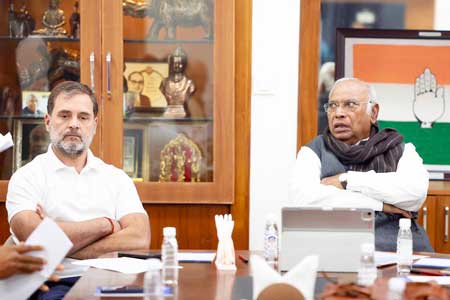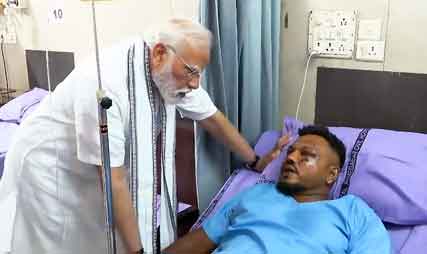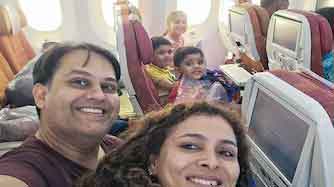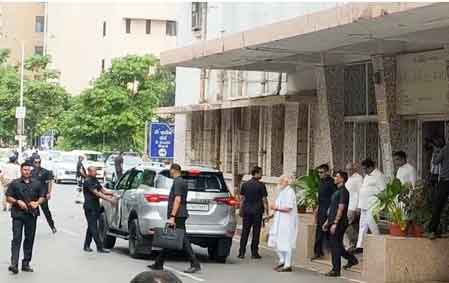The Congress party was once the dominant political force in Gujarat, shaping the state’s governance since independence. However, over the past 30 years, the party has witnessed a dramatic downfall, losing ground to the BJP’s aggressive electoral strategies, organisational strength, and ideological appeal.
From winning 149 out of 182 seats in 1985 to securing just 17 in 2022, Congress’s decline in Gujarat is a result of leadership failures, internal factionalism, and an inability to counter the BJP’s rising influence.
As the party prepares to host the 84th All India Congress Committee (AICC) Conclave in Ahmedabad on April 8-9, the move is seen as a desperate attempt to revive its presence in a state where it is on the brink of political irrelevance.
The turning point for Congress came in 1995, when the BJP, riding on the Hindutva wave and its well-organised cadre, won the Gujarat Assembly elections for the first time, which ended Congress’s uninterrupted rule and marked the beginning of a steady erosion of its voter base.
Post-2002, Congress attempted to make a comeback by focusing on agrarian distress and anti-incumbency factors, but the BJP’s model of governance and PM Modi’s personal brand overshadowed these efforts.
Congress saw brief moments of hope, particularly in the 2017 elections when it secured 77 seats, its highest tally in over two decades. This was driven by strong anti-BJP sentiment among Patidars and youth mobilisation efforts. However, Congress failed to maintain this momentum due to infighting, lack of decisive leadership, and an over-reliance on last-minute electoral strategies rather than long-term cadre-building.
The 2022 Assembly elections were a historic low for Congress, as it managed only 17 seats, down from 77 in 2017. The party’s vote share plummeted, and it was even overtaken by the Aam Aadmi Party (AAP) in key urban areas.
Analysts attribute this decline to multiple factors, including Congress’s failure to present a strong alternative narrative, its inability to retain influential leaders, and the BJP’s sustained grassroots outreach programs.
The emergence of AAP further split the opposition vote, effectively reducing Congress’s role in Gujarat’s political arena to near irrelevance.
Historically, Congress enjoyed widespread support in Gujarat, particularly under Madhavsinh Solanki’s KHAM (Kshatriya, Harijan, Adivasi, Muslim) strategy in the 1980s.
The party’s landslide victory in 1985, where it won 149 seats, remains its best electoral performance in the state. However, this coalition started disintegrating in the 1990s, as caste-based politics evolved, Hindutva sentiment grew stronger, and the BJP’s aggressive grassroots campaigning eroded Congress’s traditional vote banks.
Congress also suffered from internal conflicts, with leaders like Shankersinh Vaghela breaking away to form their own factions, further weakening its organisational structure.
One of Congress’s biggest weaknesses in Gujarat has been its failure to build and retain strong state-level leadership.
Unlike the BJP, which nurtured local leaders and created a robust cadre-based network, Congress remained heavily dependent on national leaders who failed to establish a direct connection with voters.
The BJP, under PM Modi’s leadership, successfully expanded its influence among Patidars, OBCs, and urban middle-class voters, while Congress struggled to adapt to the state’s changing political landscape.
The exit of young leaders like Hardik Patel, who played a crucial role in the 2017 Patidar agitation but later joined the BJP, further exposed the party’s inability to retain emerging political figures.
As the AICC conclave takes place in Ahmedabad, Congress leaders aim to discuss strategies for the upcoming 2024 Lok Sabha elections and explore ways to regain lost ground in Gujarat.
However, political analysts argue that unless the party undergoes deep structural reforms, invests in long-term grassroots mobilisation, and develops a strong state leadership, its prospects for revival will remain bleak.






Tripura has begun experimental soilless hydroponic farming: Minister
The Tripura government has experimentally started the hydroponics method of cultivation without any soil, the state’s agriculture minister Ratan Lal Nath said here on Friday.
Assam Rifles seized cannabis worth Rs 30 lakh from Tripura
In a swift and decisive operation against narcotics smuggling, Assam Rifles, in close coordination with representatives of the Directorate of Revenue Intelligence (DRI), successfully seized approximately 195 kg of marijuana from the general area of Taranagar, Agartala during the early hours of 12 June.
High-Level Meeting Held to Curb Illegal Infiltration in Tripura
A high-level administrative meeting was held today at the state secretariat under the chairmanship of Chief Secretary J. K. Sinha, following the directives of Tripura Chief Minister Prof. (Dr.) Manik Saha, to review and strengthen measures against illegal infiltration in the state.
Agriculture minister announces development of 3 new paddy varieties in Tripura
The state agriculture and farmers welfare department minister Ratan Lal Nath on Friday announced development of three new paddy varieties in Tripura, which can address the recurring flood-related challenges faced by farmers in the state.
CM Dr Manik Saha inaugurates state-of-the-art Cancer Care Unit in Agartala Private Run Hospital
Chief Minister Prof. (Dr.) Manik Saha on Friday inaugurated a state-of-the-art Cancer Care Center at a private run hospital in Agartala. The new center has been established in collaboration with the International Oncology Cancer Institute, aiming to make quality cancer treatment more accessible within the state.
‘I can’t believe I survived’, says lone survivor of Air India crash in emotional meeting with PM Modi
Prime Minister Narendra Modi on Friday met Vishwash Kumar Ramesh, the sole survivor of the devastating Air India plane crash. Ramesh, a British national of Indian origin, is recovering from injuries sustained in the crash and is being treated at a hospital in Ahmedabad.
Ahmedabad crash: Two Manipuri crew members of London-bound Air India flight killed
Two cabin crew members from Manipur - Kongbrailatpam Nganthoi Sharma (20) and Lamnunthem Singson (26) – were killed when the London-bound Air India flight, carrying over 240 passengers, crashed shortly after taking off from the Ahmedabad airport.
Doctor couple’s dreams of new beginning in UK turned to ashes
A doctor couple’s dreams of a new beginning together as a family in UK turned into a nightmare and their last trip together as the ill-fated flight that was to take them to London crashed seconds after take-off on Thursday.